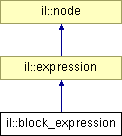il::block_expression Class Reference
This is used to model a gcc extension where you can write code like a = ({args[1]+1;args[2];}); ({args[1]+1;args[2];}) evaluates to the result of the last statement in the block. More...
#include <block_expression.h>
Inheritance diagram for il::block_expression:

Public Member Functions | |
| block_expression (block *b, variable_declaration *var_decl, type *t, location loc) | |
| virtual string | to_string () const |
| virtual block * | get_block () |
| virtual variable_declaration * | get_vardecl () |
Friends | |
| class | boost::serialization::access |
Detailed Description
This is used to model a gcc extension where you can write code like a = ({args[1]+1;args[2];}); ({args[1]+1;args[2];}) evaluates to the result of the last statement in the block.
The documentation for this class was generated from the following files:
- il/block_expression.h
- il/block_expression.cpp
 1.6.3
1.6.3